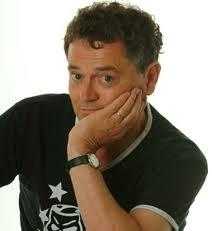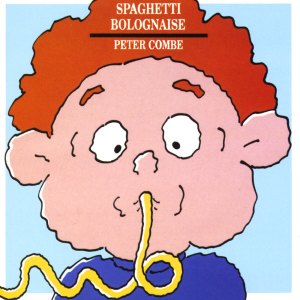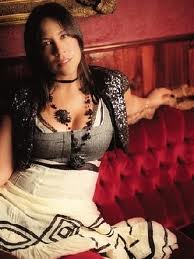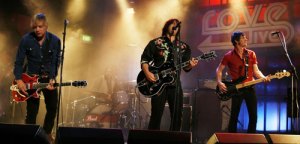 The name Michael Charles may not exactly sit up there with the likes of Chris Cheney or Daniel Johns in the limelight of today’s popular Australian guitarists, but there was a time when Charles reined King on the Australian music scene. Now living in Chicago, Michael caught up with Daniel Vigilante to discuss what he misses about Australia, cold winters, and the new generation of ‘Michael’ following in his keynote – his son, colloquially known as Mick. And as we learn, there’s permanence in music that goes deeper than simply having a song stuck in your head.
The name Michael Charles may not exactly sit up there with the likes of Chris Cheney or Daniel Johns in the limelight of today’s popular Australian guitarists, but there was a time when Charles reined King on the Australian music scene. Now living in Chicago, Michael caught up with Daniel Vigilante to discuss what he misses about Australia, cold winters, and the new generation of ‘Michael’ following in his keynote – his son, colloquially known as Mick. And as we learn, there’s permanence in music that goes deeper than simply having a song stuck in your head.
_____________________________________________________________________
When Mick Italia picked up a guitar at age 5, you’d be forgiven for thinking something along the lines: it may be a little too early to tell, but this kid may have talent. This premature opinion from your hypothetical self does not come without warrant. You see, the hypothetical you was only too aware that the Fender ‘78 sunburst stratocaster belonged to his father, and was still covered with sweat, wear and tear from last night’s performance in front of 2,000 admiring fans.
When you’re brought up the son of blues master, some of the virtuosity is bound to rub off on you, and fortunately for Mick, the fret-board dexterity rubbed off in the right places. However there was quite a gap between Mick’s first fondling with the 6-string as a wee toddler and the next time he gave it serious attention; some ten years in fact. A late starter by today’s must-make-child-prodigy generation of parents we see all too often. But Mick’s father, Michael Charles, knew that if he pushed the boundaries of his son’s natural interests, it might seriously prove detrimental to their already precarious circumstance.
The beginnings of ‘Greatness’

Michael grew up in country Victoria. He is the second of two children and only son of Mary and Salvatore “Sam”, Italian immigrants from Sicily. Michael learnt life’s most valuable lessons from his pragmatic father, and put that knowledge into practice when he opened his own mechanic shop; a learning curve in the business world which paved the way for a successful record label and distribution company that he runs from his home in Chicago to this very day.
 The other important virtue that Sam taught young Michael – indeed the virtue that makes Michael the man he is today – was his first chords. Though just a hobbyist guitar player, Sam taught Michael his first few riffs, and from that moment on, Michael knew he had found what was to become his life long love: music.
The other important virtue that Sam taught young Michael – indeed the virtue that makes Michael the man he is today – was his first chords. Though just a hobbyist guitar player, Sam taught Michael his first few riffs, and from that moment on, Michael knew he had found what was to become his life long love: music.
Michael became obsessive about the guitar, incessantly playing all day long for hours at a time. His parents were actually a little concerned when young Michael barricaded his windows with blankets “so the room would be dark and resemble a stage”. At eight, Michael was orchestrating his first band. By fifteen, he was touring.
Travelling through the United States a few years back, I spent 8 days at Michaels place. Upon meeting him, I made an introductory witticism to break the ice and said that I was hugely honoured to be staying with such an accomplished musician and almost felt the need to call him Mr. Charles. He said that that was very kind, but wouldn’t be necessary. Instead, he said, “call me ‘Greatness’”.
Chicago Blues
He has turned the basement of his ordinary house in an ordinary neighbourhood in Chicago’s lower east into a multi-million dollar world-class recording studio. On the phone hook-up for this interview, I was reminded of that quasi-American accent that comes through every now and again, especially for “a” words like ask, can’t, and ass; the inevitable affectation of too much time abroad.
 After a successful and escalating career touring Australia in the 80’s, recognised as one of Australia’s most prolific songwriters by the Australian Performers Right Association (APRA) and regular features in the nation’s top music trade magazines, he was invited to play at Buddy Guy’s Legends in Chicago in 1989, a prestigious accolade that he now holds as a high point.
After a successful and escalating career touring Australia in the 80’s, recognised as one of Australia’s most prolific songwriters by the Australian Performers Right Association (APRA) and regular features in the nation’s top music trade magazines, he was invited to play at Buddy Guy’s Legends in Chicago in 1989, a prestigious accolade that he now holds as a high point.
With much deliberation, he decided to go. “It was a tough decision man. Things were going so great for me professionally, but it meant I would have to leave my wife and kids behind. I knew opportunities existed in the U.S, I mean, you know, when you’re a kid all you want to do is play stadiums, and well, frankly, that opportunity exists more in the U.S than in little old Australia,” he chuckled.
That was the beginning of his affair with America, which eventually put too much strain on his marriage and before long, he found himself penniless, I.D-less, insurance-less, with plenty of loneliness walking around the streets of downtown Chicago.
“Those early days were tough going man, I tell ya. I learnt a lot of valuable lessons about the cultural differences of our countries,” he said with a sombre laugh that hinted to stories of adverse “lessons” in cultural diversity. But what struck me more was that he used our countries. I ask him which country he feels more attached to, and without hesitation he tells me Australia.
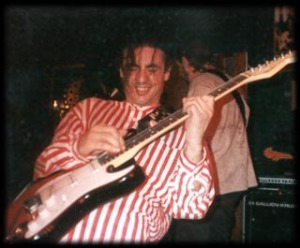 “Oh yeah, I mean, America has been great for me in so many ways, but I mean, I still call Australia home….I know I’ll be back some day. I ain’t here forever man, I ain’t built for the cold winters (laughs). I keep getting the Chicago Blues.” That amiable laugh, again reminding me of the hospitable and amiable nature that I quickly discovered at the Charles residence those few years ago. The pun however, spoke volumes.
“Oh yeah, I mean, America has been great for me in so many ways, but I mean, I still call Australia home….I know I’ll be back some day. I ain’t here forever man, I ain’t built for the cold winters (laughs). I keep getting the Chicago Blues.” That amiable laugh, again reminding me of the hospitable and amiable nature that I quickly discovered at the Charles residence those few years ago. The pun however, spoke volumes.
Michael goes on to tell me that he misses touring in Australia, and the thriving live music scene of the 80’s, of which he was enthusiastically part of. But most of all, he misses his kids. He keeps regular contact with both Mick and his sister Laura. And like his father before him, Michael has played a major role in introducing music to his son’s life, from guitars lying around the house ready to be explored, blues pumping out of the stereo, and those first few lessons of an E minor shape.
A new generation of Michael
“I grew up with blues from very young age,” Mick tells me. “There was always music or an instrument around…but sadly, after my father went to America (Michael was 6yrs old) I didn’t pick up a guitar until I was well into high school.”
 Was there a particular reason that he stayed away from the guitar? “No, not really. I think I know what you’re insinuating, but it wasn’t a conscious decision to block anything out or anything like that. I was just a kid, you know. I liked footy and surfing and skateboarding. Music came later. Well, at least playing music anyway. I really didn’t get interested in the guitar until I saw my friend play a Tool song one day in the music room at school. I asked him to teach it to me and haven’t looked back since. I always knew I wanted to play at some point though. I mean, I knew all about my father’s success and musical talent and everything, and we’ve regularly spoken on the phone from as far back as I can remember, so I just needed that trigger to get me into gear to actually make the decision, ‘Right! I’m gonna learn this thing.’ I think he was quietly ecstatic when I told him I’ve learnt the opening riff to Smoke on the Water on guitar,” (laughs).
Was there a particular reason that he stayed away from the guitar? “No, not really. I think I know what you’re insinuating, but it wasn’t a conscious decision to block anything out or anything like that. I was just a kid, you know. I liked footy and surfing and skateboarding. Music came later. Well, at least playing music anyway. I really didn’t get interested in the guitar until I saw my friend play a Tool song one day in the music room at school. I asked him to teach it to me and haven’t looked back since. I always knew I wanted to play at some point though. I mean, I knew all about my father’s success and musical talent and everything, and we’ve regularly spoken on the phone from as far back as I can remember, so I just needed that trigger to get me into gear to actually make the decision, ‘Right! I’m gonna learn this thing.’ I think he was quietly ecstatic when I told him I’ve learnt the opening riff to Smoke on the Water on guitar,” (laughs).
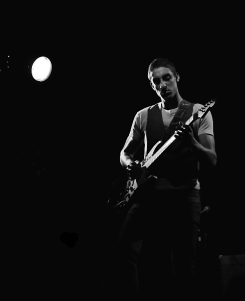 Mick certainly hasn’t looked back since; he went on to form an original ‘nu-metal’ band in high school with the friend that taught him the Tool riff (who ironically was relegated to the less respected bass – Mick clearly had a penchant and talent for the guitar and his friend wisely let it ferment). That band made the state finals of the Battle-of-the-Bands competition and won $1,000 worth of studio time, which they recorded their first EP with.
Mick certainly hasn’t looked back since; he went on to form an original ‘nu-metal’ band in high school with the friend that taught him the Tool riff (who ironically was relegated to the less respected bass – Mick clearly had a penchant and talent for the guitar and his friend wisely let it ferment). That band made the state finals of the Battle-of-the-Bands competition and won $1,000 worth of studio time, which they recorded their first EP with.
Music has continued its perpetual influence on Mick’s life and he continues to make original and highly acclaimed progressive music with his new band, art-rockers ‘Them’, and can be found on any given night rocking it out in the venues that his father used play here in Melbourne.
“Yeah, it’s funny that. We played at the Barleycorn Hotel (in Collingwood) a few weeks back and I had just spoken to my father a few days before and he told me that he used to play there. As it turned out, the booking manager actually remembered him. Just goes to show you, I suppose, that once you’re in this industry, behind the curtain or in front of it, there’s really no escaping it.”
Going back to the Old School
Michael Charles recorded his first EP in 1983 with his friend and industry associate Greg Williams, who ran a record-label and studio called ‘Dex Audio’ in North Melbourne. And with the motif of longevity clearly coming from my experience with ‘music industry types’, I wasn’t too surprised to learn that Dex Audio is still up and running at the same studio today.
Michael worked with Greg from ‘83-’89 recording most of his work in the Dex Audio studios, back when albums were made of vinyl. When Michael was last in Melbourne in November 2005 (he comes every couple of years, mostly to catch up with family), he took Mick to his mate’s studio and the two of them caught up on old times, told stories about the early days of gigging and the lackadaisical nature of the industry at the time.
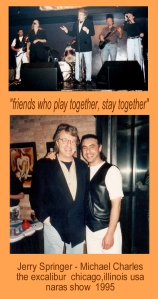 “Yeah it was great to catch up with Mike (Michael Charles) and his son,” Greg told me over the phone, after finally catching him after 3 days of constant trying. Even now he tells me that he doesn’t have much time, but would graciously spare me “a few minutes”.
“Yeah it was great to catch up with Mike (Michael Charles) and his son,” Greg told me over the phone, after finally catching him after 3 days of constant trying. Even now he tells me that he doesn’t have much time, but would graciously spare me “a few minutes”.
“It’s always great to see Mike, no matter how many years go by. I think Mick really enjoyed hearing the stories of his old man’s antics and the general picture of what the music industry was like when his old man was king of it, so to speak.”
He went on to tell me about the new album that Michael Charles is releasing (on his own label, Moonlight Records, recorded at his basement studio in Chicago called Sammary Sound), and that Mick is featured on album. That album, by the way, was released February 2006 and is called I’m Nobody’s Fool. It’s Charles’ 17th major release.
“It’s terrific that after so many years of playing, his (M. Charles) son is actually appearing on one of his albums.”
Michael sent the master tapes to Dex Audio studios, where Greg co-produced and engineered the final mastering on the album, after getting Mick in for a few days to lay down some guitar tracks over the top of 2 songs. It’s the first time Greg and Michael have worked on a Michael Charles album since 1991.
 And if the enigmatic circle of longevity continues to wield its influence, Mick too may just never come back from Chicago when he goes to visit this December for the first time in his short 23 years on earth. And meant with the best intention, I hope he doesn’t.
And if the enigmatic circle of longevity continues to wield its influence, Mick too may just never come back from Chicago when he goes to visit this December for the first time in his short 23 years on earth. And meant with the best intention, I hope he doesn’t.
www.michaelcharles.us – Official website of Michael Charles
www.sammarystudio.com – Michael Charles’ Studio website
www.moonlightlable.com – Michael Charles’ own record label.
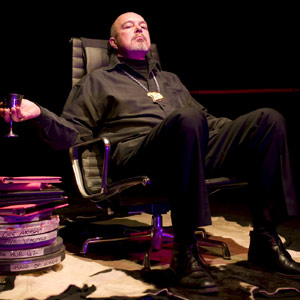 Frank Thring is one of those Aussie icons a lot of people won’t admit to canonising. Cavaliering in funeral black outfits and bling to shame even the most successful ghetto rappers, Thring has been described as the most flamboyant, eccentric, intimidating, and often cruelly sarcastic rebels Australia has even seen. An iconoclast than an icon. Oh, and he was also a damn great actor—but that’s by the way.
Frank Thring is one of those Aussie icons a lot of people won’t admit to canonising. Cavaliering in funeral black outfits and bling to shame even the most successful ghetto rappers, Thring has been described as the most flamboyant, eccentric, intimidating, and often cruelly sarcastic rebels Australia has even seen. An iconoclast than an icon. Oh, and he was also a damn great actor—but that’s by the way.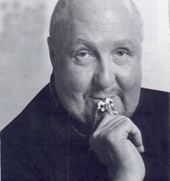 As for the text itself, Cahill describes it as “a very lyrical piece. The language is quite dense and rhythmic. Frank was well known for doing these theatrical monologues, particularly on radio; he used to use a lot of rhyme and dog lore and was very fond of limericks, so Barry’s woven a lot of that in there. It’s a very rich tapestry of language and images and people. It’s pretty much an epic poem more than a monologue.”
As for the text itself, Cahill describes it as “a very lyrical piece. The language is quite dense and rhythmic. Frank was well known for doing these theatrical monologues, particularly on radio; he used to use a lot of rhyme and dog lore and was very fond of limericks, so Barry’s woven a lot of that in there. It’s a very rich tapestry of language and images and people. It’s pretty much an epic poem more than a monologue.”